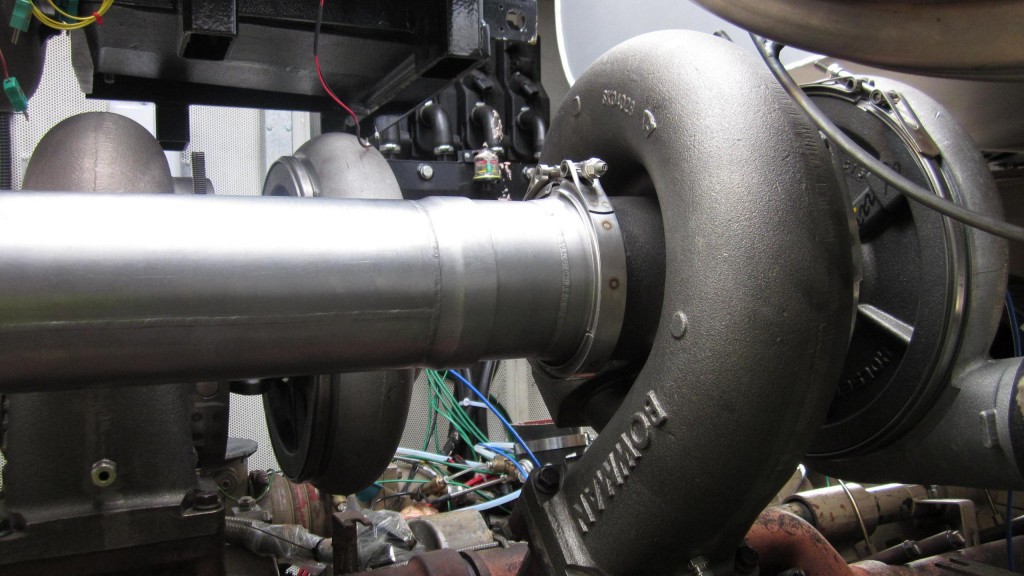Bowman Power achieves landmark UHC emissions reduction for gas generators
First trial proves technology in Waste-to-Energy application

Bowman Power Group Ltd has conducted emissions trials on a gas fuelled generator to investigate the effect of using its Electric Turbo Compounding (ETC) technology on unburnt hydrocarbon (UHC) emissions. Initial findings indicate a 25-50% reduction in UHC emissions, in addition to the previously proven benefits in respect of improved engine efficiency and reductions in CO2 emissions.
This was achieved by reducing the scavenging pressure in the engine cylinders, almost entirely eliminating fuel short circuiting and also reducing the release of non-combusted fuel. More information on the specifics of how this was achieved is available on request or directly at Bowman's website.
To achieve this level of reduction would typically require long research and development periods for ‘in-engine' solutions by an original equipment manufacturer, followed by intrusive and costly engine modification. Bowman's ETC system does away with this requirement, reducing costs and increasing the speed of upgrading the engine.
Emissions legislation ready
Reducing emissions continues to be the most significant element of the global climate change agenda, from the National Emission Ceilings Directive; to the Medium Combustion Plant Directive; the forthcoming TA Luft in Germany and other provisions on the horizon. The rise in the use of gas fuelled generators has led to a rise in UHC emissions, including methane which has a greenhouse gas effect 25-100 times that of CO2. This has led to the need for tighter UHC emissions regulations which are now on the horizon.
In anticipation of this legislation, and in line with their objective to making gas and diesel generators work more efficiently and environmentally, Bowman has continued to evolve its understanding of how its ETC technology interacts with the engines and generators it's installed on. The benefits of recovering waste heat energy from the exhaust gas and converting it to free, grid-quality electrical power are well understood, but the company is now well progressed with understanding this additional benefit of reduced emissions of harmful greenhouse gases.
With the flagship ETC 1000 system, end-users can still maintain the same power output using less fuel and producing fewer CO2 emissions, or produce additional power with improved fuel efficiency, and they can now do this knowing that the effect of operating their engines or generators on overall greenhouse gas emissions is much reduced.
Proven in the field
This ability to cut UHC emissions has been initially demonstrated with a recent installation with a UK waste to energy company, where a reduction of 32% (from 1100 to 750ppm) was observed. This equates to a reduction in greenhouse gas emissions for this specific application of 12%, when taking both the direct reduction in CO2 emissions from the fuel savings (~5%) and reduction in CH4 emissions into account.
This builds on Bowman's existing track record of reducing CO2 emissions in generators, having already reduced carbon emissions by over 300,000 tonnes as a direct result of fuel consumption improvements. It is estimated that when methane emissions are included the ETC system can achieve an 8 - 23% reduction in greenhouse emissions of gas fuelled engines/generators over a 20-year time horizon. The company is planning further tests and demonstrations of this important finding during 2019.
Paul Dowman-Tucker, CEO of Bowman, commented, "The global energy mix needs to be greener and more energy efficient. From day one that's what we have set out to do with our ETC technology, enabling more efficient and cleaner operations with fossil fuels where it is necessary to use them. These latest results are truly exciting and, coupled with our existing strong track record for reducing CO2 emissions, really cement our commitment to this goal."
"This achievement is yet further indication of how unique the ETC system is," said Keith Douglas, Head of Performance Engineering at Bowman. "We are not aware of any other technology that can be fitted to an engine to significantly reduce unburnt hydrocarbons, whilst improving fuel consumption."


